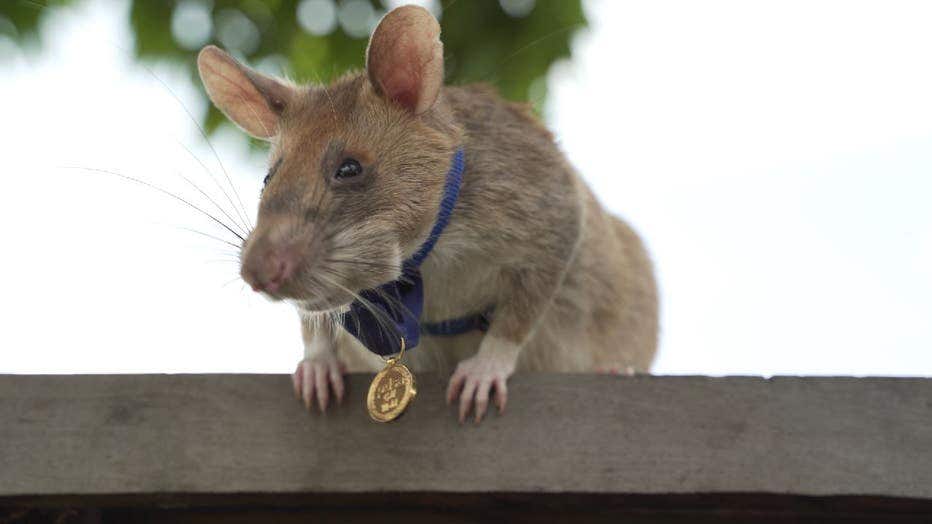Magawa, 'hero' rat who found over 100 land mines, dies in retirement
Magawa, an award-winning rat who sniffed out dozens of land mines in Cambodia and went on to enjoy life in retirement, died over the weekend. He was 8 years old.
APOPO, a non-profit group that trains the so-called HeroRATs like Magawa to detect the smell of buried land mines, made the announcement Tuesday on its website — writing that a "hero" had been laid to rest.
"Magawa was in good health and spent most of last week playing with his usual enthusiasm, but towards the weekend he started to slow down, napping more and showing less interest in food in his last days," the announcement read.
The African pouched rat was born in November 2013 in Tanzania, where APOPO maintains its operational headquarters and training and breeding center. He was sent to Cambodia in 2016.
Magawa detected more than 100 land mines and other explosives during his five-year career before retiring in 2021. The rat also won a gold medal in 2020 from the Britain-based People’s Dispensary for Sick Animals, considered the highest award for gallantry an animal can receive.
"His contribution allows communities in Cambodia to live, work, and play without fear of losing life or limb," the nonprofit said.

Magawa, an African pouched rat, is pictured in an undated file image. (Credit: Provided/APOPO)
Almost three decades of civil war that ended in 1998 left Cambodia littered with land mines and other unexploded ordnance that continues to kill and maim. African giant pouched rats are believed to be especially well-suited for land mine clearance because their small size lets them walk across minefields without triggering the explosives.
At the time of Magawa’s retirement, the APOPO said the rat had cleared more than 1.5 million square feet of land — the equivalent of some 20 soccer fields.
Magawa’s death was announced a day after three mine-removal experts working for another group were killed by an accidental explosion of an anti-tank mine in Cambodia’s northern province of Preah Vihear.
During Magawa’s retirement, he was housed in his usual cage in Cambodia’s northwestern province of Siem Reap. He was fed the same food — mostly fresh fruit and vegetables — that sustained him during his active career. To keep him trim, he was released for 20-30 minutes a day into a larger cage with facilities such as a sandbox and a running wheel.
His death at 8 years of age was not unusual for the species, the nonprofit says.
"All of us at APOPO are feeling the loss of Magawa and we are grateful for the incredible work he’s done," the statement said, adding that Magawa "will leave a lasting legacy in the lives that he saved."
This story was reported from Cincinnati. The Associated Press contributed.

